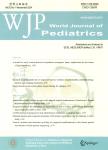Early term infants are at increased risk of requiring neonatal intensive care
作者机构:New York University School of MedicineNew York University Langone Medical CenterNew YorkUSA
出 版 物:《World Journal of Pediatrics》 (世界儿科杂志(英文版))
年 卷 期:2016年第12卷第1期
页 面:76-81页
核心收录:
学科分类:1002[医学-临床医学] 100202[医学-儿科学] 10[医学]
主 题:gestational age hypoglycemia neonatology respiratory distress syndrome
摘 要:Background: Increasing evidence is demonstrating thatinfants born early on during the term period are at increasedrisk of morbidity compared with infants born closer to acomplete 40 week gestational pregnancy. The purpose of thisstudy was to compare early term [gestation age (GA): 37-376/7 weeks] neonatal outcomes with those of other full termneonatal intensive care unit (NICU) ***: Retrospective chart review of all term infantsadmitted to the NICU at New York University LangoneMedical Center over a 17 month period. Subjects weregrouped and analyzed according to their GA at birth: 1)early term infants (GA between 37 0/7 to 37 6/7 weeks) and2) other term infants (38 0/7 weeks and older).Results: Early term infants were more likely to requireNICU care than other term infants [relative risk: 1.42,95% confidence interval (CI)=1.07-1.88), P=0.01]. In theNICU, they are more likely to manifest respiratory distresssyndrome [odds ratio (OR)=5.7, 95% CI=1.6-19.8, P0.01]and hypoglycemia (OR=4.6, 95% CI=2.0-10.4, P0.001).In addition, early term neonates were more likely to beborn via elective cesarean section than other term neonates(OR=4.1, 95% CI=2.0-8.5, P0.001).Conclusions: Being born at early term is associatedwith increased risk of respiratory disease and hypoglycemiarequiring neonatal intensive care. Further efforts directedat decreasing early term deliveries may be warranted.



